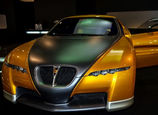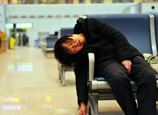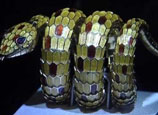
A concert of Buddhist music - classical, contemporary and crossover - will be staged during the upcoming Spring Festival holiday to express hopes and prayers for a happy Chinese Lunar New Year. Li Anlan reports.
Buddhist music, which originated in Buddhist religious rituals, is increasingly popular among ordinary music lovers for its uplifting, soothing qualities.
People feeling stress find a calming and comforting power in the ancient chants and music performed with traditional Chinese musical instruments. Musicians increasingly are tapping into this traditional form of expression.
Buddhist music is frequently described as having elegance, dignity, depth, clarity and sincerity. It can be both tranquil and joyous.
On February 22, an "Illuminating the Soul" concert of Buddhist music will be staged at the Mercedes-Benz Arena, with prayers for the coming year. The Spring Festival will begin from February 10 and go through 24.
The concert will feature Taiwanese pop singer Chyi Yu, mainland singers Sa Dingding and Sangji Pingcuo, and a monastic choir and traditional orchestra from Shanghai's Jade Buddha Temple, as well as other musicians.
Music, singing hymns and chanting in Buddhist temples are considered a way to touch deep emotions, inspire and promote reflection and meditation.
Buddhist music originated in the dignified chanting of scriptures and sutras in monasteries in India and developed different characteristics as Buddhism traveled to other countries. It acquired both folk elements and those of imperial courts.
During the Eastern Han Dynasty (AD 25-220), Buddhism arrived in China. It became more than chanting and incorporated the tonality of Chinese folk music. Scriptures were translated into Chinese and without traditional hymns, monks adapted classical folk songs along with court music.
Cao Zhi (AD 192-232), the poet son of Wei Emperor/warlord Cao Cao (115-220), was renowned for his compositions and singing. He wrote the first Buddhist hymn composed in Chinese style, "Yushan Fanbei," which was the foundation for Chinese Buddhist music, later also also called fanbei in Chinese.
Buddhist music, which is rooted in religion, was beloved by many Chinese rulers and was deeply influenced by several emperors.
Emperor Wu of the Liang Dynasty (AD 502-557) loved Buddhist music so much that he himself wrote several compositions, such as "Da Huan" ( "Great Joy"), "Tian Dao" ("The Heavenly Way") and "Mie Guo E" ("Cessation of Evil and Wrongdoing").
Modernization
Today Buddhist music is being modernized. The words are simple and easy to understand, all in Chinese, and the musical style is more contemporary.
"Buddhist music is very soothing and quiet, close the heart, and it can relax the nerves to achieve a more peaceful state of mind," says Master Shengjing, a singer in the Jade Buddha Temple monks' choir.
Traditionally Buddhist masters chanted, with instrumental accompaniment. "As we formed the choir, we made it easier for the public to accept," says the master, who has been with the group for five or six years.
Some orchestra works can be very festive and loud. Folk instruments add diversity, color and richness.
In 2009, the first multimedia Buddhist musical "Master Hongyi" was produced jointly by the Shanghai Jade Buddha Temple, Shanghai Conservatory of Music and Shanghai Theater Academy.
It commemorated the 130th anniversary of the birth of Master Hongyi, a legendary Buddhist monk who was a master in music, painting, drama, calligraphy and poetry. He wrote "Farewell Song," a short song familiar to many Chinese people.
No longer used only as a spiritual aid in religious settings, Buddhist music is reaching the general public. New compositions, both traditional and crossover, attract many listeners.
"More young people are listening to Buddhist music because of the social and working pressure in modern life," says Master Shengjing. "Some come here for short-term classes and music is part of them."
 |
















 A Taiwan student's adventure in Beijing
A Taiwan student's adventure in Beijing


![]()
